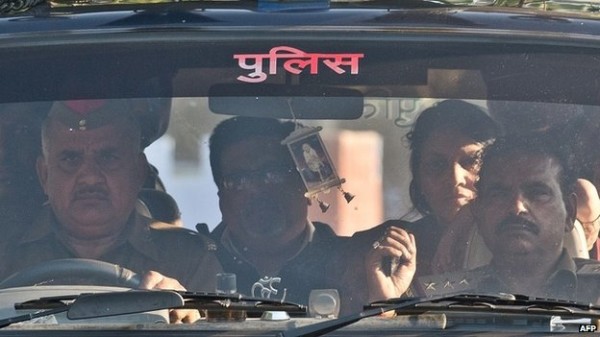
The couple - both dentists - say they will appeal against their convictions
An Indian couple have been sentenced to life in prison for murdering their daughter, Aarushi Talwar, and their Nepalese servant, Hemraj Banjade.
Rajesh and Nupur Talwar were found guilty on Monday of murder, destroying evidence and misleading investigators.
Their 14-year-old daughter was found murdered at their home in May 2008.
Suspicion initially fell on Hemraj until his bludgeoned body was found on the Talwars’ roof just one day later.
The murders generated huge interest in India, with every twist and turn in the case receiving wall-to-wall coverage.
Prosecutors sought the death sentence arguing that this was “the rarest of rare cases”. The defence team stressed the lack of hard evidence and said the couple were widely respected professionals.
The Talwars’ lawyers have said they will appeal against the verdict.
“This is nothing but a witch hunt,” one told the CNN-IBN news channel.
Wife’s despair
Mr Banjade’s wife, Khum Kala Banjade, also spoke out after the sentencing, telling BBC Nepali she was angry her husband had been framed for the killing at first.
“His family made false accusations against my husband who had done nothing. They killed their child and then my husband, and claimed that my husband ran away after killing their daughter.
“My husband was a simple and honest man. He was innocent but he had to face false charges. For the murder, the man should have been hanged to death.”
Judge Shyam Lal based Monday’s verdict on circumstantial evidence as key forensic evidence had been lost during two flawed investigations.

Some experts say the case highlighted a "clash of cultures" within India, pitting police and conservative sectors of society
Aarushi was found with her throat slit and a fatal head injury in her own bedroom, next door to her parents’ room at their home in the affluent Delhi suburb of Noida.
Prosecutors alleged that the Talwars killed their daughter in a rage when they found her in a compromising situation with Hemraj.
They also argued that Aarushi’s throat was slit in a manner indicating someone with medical skills, and that the two victims were hit by a golf club that was initially hidden by the Talwars.
The prosecutors said the crime scene had also been dressed to mislead investigators.
In the early days of the police investigation, Aarushi was described as a girl of “loose moral character” who chatted with boys and went for “sleepovers” at friends’ homes.
Such statements prompted an outcry from women’s and child rights groups.
Some experts say the case highlighted a “clash of cultures” within India, pitting police and conservative sectors of society against what they saw as the “excesses of the upper middle class”.
The case enthralled India, receiving almost unprecedented levels of media scrutiny.



Leave a reply